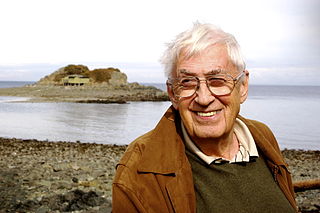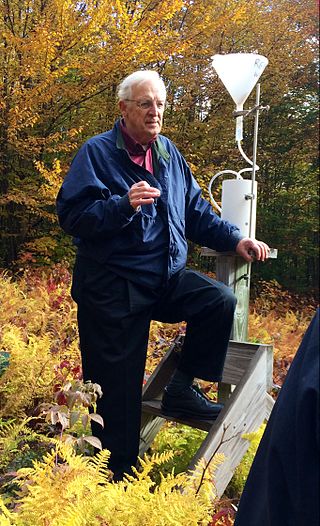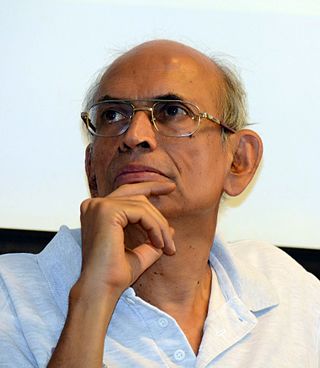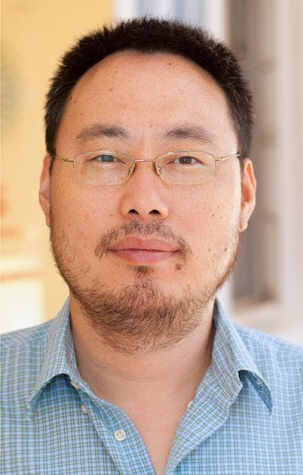Related Research Articles

Crawford Stanley "Buzz" Holling, was a Canadian ecologist, and Emeritus Eminent Scholar and Professor in Ecological Sciences at the University of Florida. Holling was one of the conceptual founders of ecological economics.

Ramon Margalef i López was a Spanish biologist and ecologist. He was Emeritus Professor of Ecology at the Faculty of Biology of the University of Barcelona. Margalef, one of the most prominent scientists that Spain has produced, worked at the Institute of Applied Biology (1946–1951), and at the Fisheries Research Institute, which he directed during 1966-1967. He created the Department of Ecology of the University of Barcelona, from where he trained a huge number of ecologists, limnologists and oceanographers. In 1967 he became Spain's first professor of ecology.

Gene Elden Likens is an American limnologist and ecologist. He co-founded the Hubbard Brook Ecosystem Study at the Hubbard Brook Experimental Forest in 1963, and founded the Cary Institute of Ecosystem Studies in Millbrook, New York in 1983.
Stephen P. Hubbell is an American ecologist on the faculty of the University of California, Los Angeles. He is author of the unified neutral theory of biodiversity and biogeography (UNTB), which seeks to explain the diversity and relative abundance of species in ecological communities not by niche differences but by stochastic processes among ecologically equivalent species. Hubbell is also a senior staff scientist at the Smithsonian Tropical Research Institute in Balboa, Panama. He is also well known for tropical forest studies. In 1980, he and Robin B. Foster of the Field Museum in Chicago, launched the first of the 50 hectare forest dynamics studies on Barro Colorado Island in Panama. This plot became the flagship of a global network of large permanent forest dynamics plots, all following identical measurement protocols. This global network now has more than 70 plots in 28 countries, and these plots contain more than 12000 tree species and 7 million individual trees that are tagged, mapped, and monitored long-term for growth, survival and recruitment. The Center for Tropical Forest Science coordinates research across global network of plots through the Smithsonian Tropical Research Institute. The program has expanded into the temperate zone, and is now known as the Forest Global Earth Observatory Network or ForestGEO.

Madhav Dhananjaya Gadgil is an Indian ecologist, academic, writer, columnist and the founder of the Centre for Ecological Sciences, a research forum under the aegis of the Indian Institute of Science. He is a former member of the Scientific Advisory Council to the Prime Minister of India and the Head of the Western Ghats Ecology Expert Panel (WGEEP) of 2010, popularly known as the Gadgil Commission.
Simon Asher Levin is an American ecologist and the James S. McDonnell Distinguished University Professor in Ecology and Evolutionary Biology and the director of the Center for BioComplexity at Princeton University. He specializes in using mathematical modeling and empirical studies in the understanding of macroscopic patterns of ecosystems and biological diversities.

Nils Christian Stenseth is a Norwegian biologist with a focus on ecology and evolution. He is the director of the Centre for Ecological and Evolutionary Synthesis (CEES) at the University of Oslo, CEES was given Centre of Excellence status by the Research Council of Norway in December 2006. He is also the Chief Scientist at the Norwegian Institute of Marine Research in Norway, and Honorary Professor of Tsinghua University.

Cang Hui is a mathematical ecologist at Stellenbosch University. His research interests are proposing models and theories for explaining emerging patterns of biodiversity, networks and adaptive traits in ecology and evolution.

Ricardo Rozzi is a Chilean ecologist and philosopher who is professor at the University of North Texas and the Universidad de Magallanes (UMAG). His research combines both disciplines through the study of the interrelations between the ways of knowing and inhabiting the natural world, proposing a dynamic continuous reciprocal feedback between both domains.
The ECI Prize is a prize awarded annually from 1986 onwards to an ecologist distinguished by outstanding and sustained scientific achievements. It is awarded jointly by the International Ecology Institute, a non-profit organization of research ecologists based in Germany dedicated to fostering ecological knowledge and awareness, and the Otto Kinne Foundation.
Tom Michael Fenchel is a Danish marine ecologist and professor first at the University of Aarhus, later at the University of Copenhagen. He is a highly cited scientist and known for, among other things, Fenchel's Law.
Otto Kinne was a German marine biologist. He was director of Germany's Biologische Anstalt Helgoland from 1962 to 1984. From 1967 he was a professor at the University of Kiel. He established the Inter-Research Science Center (IRSC) in 1979 and is its Director, and the International Ecology Institute in 1984, of which he was the President. The IRSC publishes eight international journals of which Kinne is the founder, including Marine Ecology Progress Series and Climate Research. He established the Otto Kinne Foundation in 1992 to provide grants to ecologists in Russia and Eastern Europe.
Robert Treat "Bob" Paine III was an American ecologist who spent most of his career at the University of Washington. Paine coined the keystone species concept to explain the relationship between Pisaster ochraceus, a species of starfish, and Mytilus californianus, a species of mussel.

Stephen Russell Carpenter is an American lake ecologist who focuses on lake eutrophication which is the over-enrichment of lake ecosystems leading to toxic blooms of micro-organisms and fish kills.
Monica G. Turner is an American ecologist known for her work at Yellowstone National Park since the large fires of 1988. She is currently the Eugene P. Odum Professor of Ecology at the University of Wisconsin–Madison.

Josep Penuelas or Josep Peñuelas i Reixach is a Catalan ecologist and researcher internationally recognized for his contributions in the fields of ecology and the environment. He was a student of Ramon Margalef.
Madhur Anand is a Canadian poet and professor of ecology and environmental sciences. She was born in Thunder Bay, Ontario and lives in Guelph, Ontario.

Diana Harrison Wall is the Founding Director of the School of Global Environmental Sustainability, a Distinguished Biology Professor, and Senior Research Scientist at the Natural Resource Ecology Laboratory at Colorado State University. She is an environmental scientist and a soil ecologist and her research has focussed on the Antarctic McMurdo Dry Valleys. Wall investigates ecosystem processes, soil biodiversity and ecosystem services and she is interested in how these are impacted by global change. The Wall Valley was named after her in recognition of her research in the McMurdo Dry Valleys. Wall is a globally recognised leader and speaker on life in Antarctica and climate change.
Thavamani Jegajothivel Pandian, a retired professor of Madurai Kamaraj University (MKU), is an Indian geneticist and ecologist, known for his pioneering studies in bioenergetics and animal ecology. A recipient of the WorldFish Naga Award, he is a former chairman of the Task Force Committee on Aqua and Marine Biotechnology of the Department of Biotechnology of the Government of India, a former president and a fellow of The World Academy of Sciences and an elected fellow of the Indian National Science Academy, National Academy of Sciences, India, Indian Academy of Sciences and the National Academy of Agricultural Sciences. The Council of Scientific and Industrial Research, the apex agency of the Government of India for scientific research, awarded him the Shanti Swarup Bhatnagar Prize for Science and Technology, one of the highest Indian science awards, in 1984, for his contributions to biological sciences.
Otto Ludwig Lange was a German botanist and lichenologist. The focus of his scientific work was on the ecophysiology of wild and cultivated plants as well as lichens. He investigated heat, frost and drought resistance of lichens, bryophytes and vascular plants growing under extreme environmental conditions.
References
- ↑ "International Ecology Institute". Inter-Research Science Center. Retrieved 22 December 2016.